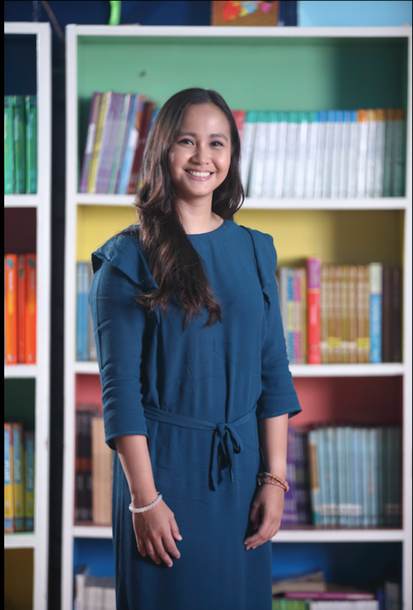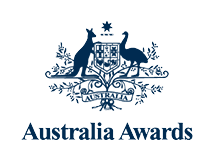Reaching the Next Generation

It was a light bulb moment for Sabrina Ongkiko when someone asked her if she wanted to be a teacher. “That was when I started thinking about it. Looking back, I realised that I was in education all those years. I was the kind of child who played teacher with her playmates. I even went as far as buying a record book so I could record their quizzes,” she said. She also took charge of their family library, lending out books to friends and going after errant borrowers.
From playing teacher with her neighbours, she has embraced the actual vocation. Sabrina is now in her 9th year as an English and science teacher and a resident librarian of Culiat Public Elementary School in Quezon City. “For me, there was an intersection between skill, passion, and a call to respond to a need. I really felt that it was my calling to teach and that there was a need in the education sector that I wanted to solve.”
The teacher as a learner
Sabrina was looking for opportunities to study overseas when she learned about Australia Awards. She applied and was accepted for a Master of Education degree at the University of Melbourne. “Studying in Australia gave me the opportunity to step back from the context that I was immersed in and reflect on it further through researching, reading journals and attending lectures by Australian experts whose works I had been reading previously. I was actually fangirling on these professors whose papers I had read prior to going there!” she said.
She considers herself lucky to be guided by brilliant minds and find friends in the academe who were more than willing to have her observe their classes. “It is a year I would always go back to,” she said.
While in Australia, Sabrina, whose subjects in the university were mostly about educational leadership, wrote different papers on school leadership. Her papers focused on “teacher leadership” and “distributed leadership” because she felt they were crucial in effectively implementing School Based Management (SBM), which was one of the biggest school reforms of the Department of Education (DepEd) then. One of her papers even won a recognition from the University of Melbourne – the first for a Filipina.
“In terms of teacher leadership, I wanted to emphasise teacher agency – that teachers have ownership of the reforms – rather than compliance. In terms of distributed leadership, I looked into strengthening stakeholder engagement and building professional learning communities. I felt that our schools need to feel that they are given more power and support to address their own challenges, which is the spirit of our law (RA 9155: Governance of Basic Education Act) from which SBM was based.”
Advocating reforms
On her return to the Philippines, Sabrina joined DepEd’s newly established office, the School Effectiveness Division (SED), which oversees the implementation of SBM. Her team was given the opportunity to create an office culture where distributed leadership is a practice.
“We made sure that school stakeholders are always part of the policy making process. Through the office, we are able to understand the school contexts better and create better policies, especially those strengthening SBM. We started with improving the school planning process, strongly emphasising the voice of the stakeholders in finding out the root causes of school problems and in designing solutions.”
She recalled, “There I was, a young teacher, talking to principals and district supervisors. It was scary.” What was on her side was the research and exposure that she had done in her study in Australia. “I came with the papers and articles that my professors shared. I knew I was not going there blindly, and I felt that I knew what I was talking about.”
Sabrina’s passion and advocacy led her to do talks that encourage support from other stakeholders. “I give talks to partners from the industry to show them why we need to help our teachers and students. DepEd cannot do educational reforms alone. In the same way that it takes a village to raise a child, it takes the whole community to provide quality education. The problem is information – a lot of people want to help but don't know how or don't know what is needed. Partners from the private sector can provide additional support and resources and can help educate our learners beyond the walls of the classroom. We need to have conversations with our industry partners.”
Inclusivity is key
In her classroom, Sabrina emphasises inclusivity, where stronger students help those who are struggling. “Teaching around 50 kids a day, I have to multiply myself. I have to teach kids to become teachers to other kids. Peer mentoring has always been mentioned as an effective strategy so I decided to incorporate it as part of my classroom routine.”
“I noticed that students began to care for one another – they were suddenly concerned about their classmates and less focused on themselves. This helps us achieve our goal in class, "lahat gagaling" (everybody will excel).”
This hope for inclusivity goes outside her classroom. “When you think about it, this generation of students will grow up to be the future citizens of the country. They will be the ones who will work, who will build, who will vote. I have 200 kids in my classes every day. If each teacher has that passion for his or her own 200 kids, then we will be able to build a powerful society. We will have Filipinos who will be able to think and solve problems. The future brings so much hope if we could just develop our kids.”
In 2016, Sabrina was named as one of The Outstanding Women in the Nation’s Service (TOWN) for her dedication in educating children, empowering teachers, and contributing to reforms in the Philippine education system.

